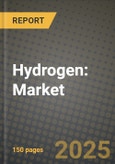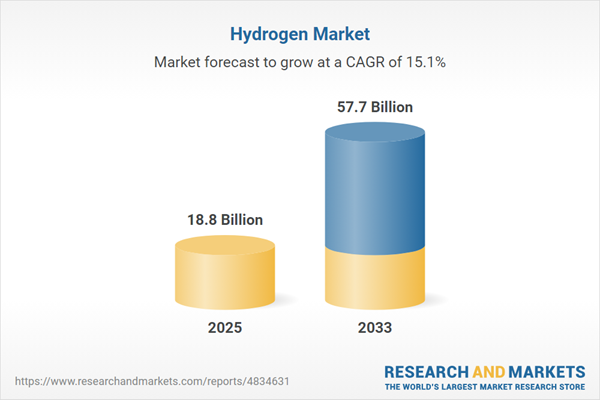The Hydrogen Market has emerged as a pivotal component of the global energy transition, gaining significant attention for its potential to decarbonize industries and transportation systems. As a versatile energy carrier, hydrogen is used in multiple applications, including fuel cells, refining processes, and industrial feedstock. Green hydrogen, produced via renewable energy sources, represents the market’s most promising segment, as it aligns with net-zero targets and sustainability goals. Blue hydrogen, produced using natural gas with carbon capture technologies, also plays a vital role in bridging the gap between fossil fuels and renewables. With growing commitments to reduce greenhouse gas emissions and reliance on conventional fuels, the hydrogen market is expanding rapidly, supported by government policies, corporate investments, and advancements in production, storage, and distribution technologies. As nations prioritize energy security and grid resilience, hydrogen is becoming an essential pillar of a low-carbon, sustainable energy future.
In 2024, the hydrogen market saw robust growth as governments and companies worldwide accelerated their commitments to clean energy initiatives. Key policy frameworks, including tax incentives, subsidies, and direct investments, spurred the development of green hydrogen production facilities and infrastructure projects. Countries in Europe and Asia, such as Germany, Japan, and South Korea, continued to lead in hydrogen adoption, with plans to scale up electrolyzer capacity and establish comprehensive hydrogen refueling networks. In the United States, federal funding and private sector partnerships bolstered the deployment of hydrogen hubs, targeting sectors like heavy-duty transportation, steel manufacturing, and ammonia production. Meanwhile, the cost of electrolyzers and renewable energy fell further, improving the economics of green hydrogen and enabling competitive production at scale. Industry collaboration intensified, with consortiums and partnerships forming across the hydrogen value chain to drive innovation, address supply chain challenges, and establish international hydrogen trade routes.
Looking ahead to 2025 and beyond, the hydrogen market is expected to continue its rapid expansion, driven by technological breakthroughs, cost reductions, and heightened global climate commitments. Advanced electrolyzer technologies, including solid oxide and proton exchange membrane systems, will enhance efficiency and lower production costs. Large-scale hydrogen projects will come online, including offshore wind-powered hydrogen facilities and mega-scale electrolysis plants in the Middle East and Australia. Infrastructure development will gain momentum, with widespread rollout of hydrogen pipelines, liquefaction plants, and refueling stations. The adoption of hydrogen-powered heavy-duty vehicles, trains, and maritime vessels will increase as fuel cell technologies mature and production scales. In addition, the integration of hydrogen into power grids as a long-duration energy storage solution will enhance grid stability and support renewable energy penetration. By leveraging government backing, private investments, and international collaboration, the hydrogen market is poised to become a cornerstone of the global energy landscape, providing a pathway to a sustainable and resilient future.
Key Insights: Hydrogen Market
- Expansion of green hydrogen projects powered by solar and wind energy is driving growth in the renewable hydrogen segment, creating opportunities for sustainable energy supply.
- Development of hydrogen refueling infrastructure for heavy-duty vehicles, buses, and trains is accelerating adoption in the transportation sector.
- Emerging global hydrogen trade routes, including international hydrogen shipping and pipeline networks, are enhancing cross-border hydrogen supply and demand.
- Advancements in hydrogen storage technologies, such as liquid hydrogen tanks and metal hydride systems, are improving efficiency and reducing costs across the supply chain.
- Increased collaboration among energy companies, technology providers, and government entities is fostering innovation and standardization within the hydrogen industry.
- Stringent climate policies and net-zero targets are pushing governments and industries toward low-carbon energy solutions, including hydrogen.
- Declining costs of renewable energy and electrolyzer technologies are improving the economics of green hydrogen production.
- Rising demand for clean hydrogen in heavy industries, such as steel, ammonia, and chemicals, is driving large-scale project investments.
- Government incentives, subsidies, and funding programs are catalyzing the development of hydrogen infrastructure and production capacity.
- High initial capital costs and limited hydrogen infrastructure remain significant barriers to large-scale adoption and market penetration.
Hydrogen Market Segmentation
By Product Type:
- Hydrogen Fuel Cells
- Hydrogen Production Technologies
- Hydrogen Storage
By Application:
- Transportation
- Power Generation
- Industrial Processes
By End User:
- Automotive
- Aerospace
- Energy Sector
By Technology:
- Steam Methane Reforming
- Electrolysis
- Biomass Gasification
By Distribution Channel:
- Direct Sales
- Online Sales
- Distributors
By Geography:
- North America (USA, Canada, Mexico)
- Europe (Germany, UK, France, Spain, Italy, Rest of Europe)
- Asia-Pacific (China, India, Japan, Australia, Vietnam, Rest of APAC)
- The Middle East and Africa (Middle East, Africa)
- South and Central America (Brazil, Argentina, Rest of SCA)
Hydrogen Market Size Data, Trends, Growth Opportunities, and Restraining Factors:
- This comprehensive Hydrogen market report delivers updated market size estimates from 2024 to 2034, offering in-depth analysis of the latest Hydrogen market trends, short-term and long-term growth drivers, competitive landscape, and new business opportunities. The report presents growth forecasts across key Hydrogen types, applications, and major segments, alongside detailed insights into the current Hydrogen market scenario to support companies in formulating effective market strategies.
- The Hydrogen market outlook thoroughly examines the impact of ongoing supply chain disruptions and geopolitical issues worldwide. Factors such as trade tariffs, regulatory restrictions, production losses, and the emergence of alternatives or substitutes are carefully considered in the Hydrogen market size projections. Additionally, the analysis highlights the effects of inflation and correlates past economic downturns with current Hydrogen market trends, providing actionable intelligence for stakeholders to navigate the evolving Hydrogen business environment with precision.
Hydrogen Market Competition, Intelligence, Key Players, and Winning Strategies to 2034:
- The 2025 Hydrogen Market Research Report identifies winning strategies for companies to register increased sales and improve market share.
- Opinions from senior executives from leading companies in the Hydrogen market are imbibed thoroughly and the Hydrogen industry expert predictions on the economic downturn, technological advancements in the Hydrogen market, and customized strategies specific to a product and geography are mentioned.
- The Hydrogen market report is a source of comprehensive data and analysis of the industry, helping businesses to make informed decisions and stay ahead of the competition. The Hydrogen market study assists investors in analyzing On Hydrogen business prospects by region, key countries, and top companies' information to channel their investments.
- The report provides insights into consumer behavior and preferences, including their buying patterns, brand loyalty, and factors influencing their purchasing decisions. It also includes an analysis of the regulatory environment and its impact on the Hydrogen industry. Shifting consumer demand despite declining GDP and burgeoning interest rates to control surging inflation is well detailed.
What's Included in the Report?
- Global Hydrogen market size and growth projections, 2024-2034
- North America Hydrogen market size and growth forecasts, 2024-2034 (United States, Canada, Mexico)
- Europe market size and growth forecasts, 2024-2034 (Germany, France, United Kingdom, Italy, Spain)
- Asia-Pacific Hydrogen market size and growth forecasts, 2024-2034 (China, India, Japan, South Korea, Australia)
- Middle East Africa Hydrogen market size and growth estimate, 2024-2034 (Middle East, Africa)
- South and Central America Hydrogen market size and growth outlook, 2024-2034 (Brazil, Argentina, Chile)
- Hydrogen market size, share and CAGR of key products, applications, and other verticals, 2024-2034
- Short- and long-term Hydrogen market trends, drivers, challenges, and opportunities
- Hydrogen market insights, Porter’s Five Forces analysis
- Profiles of 5 leading companies in the industry - overview, key strategies, financials, product portfolio and SWOT analysis
- Latest market news and developments
Key Questions Answered in This Report:
- What is the current Hydrogen market size at global, regional, and country levels?
- What is the market penetration of different types, Applications, processes/technologies, and distribution/sales channels of the Hydrogen market?
- What will be the impact of economic slowdown/recission on Hydrogen demand/sales?
- How has the global Hydrogen market evolved in past years and what will be the future trajectory?
- What is the impact of growing inflation, Russia-Ukraine war on the Hydrogen market forecast?
- What are the Supply chain challenges for Hydrogen?
- What are the potential regional Hydrogen markets to invest in?
- What is the product evolution and high-performing products to focus in the Hydrogen market?
- What are the key driving factors and opportunities in the industry?
- Who are the key players in Hydrogen market and what is the degree of competition/Hydrogen market share?
- What is the market structure /Hydrogen Market competitive Intelligence?
Available Customizations:
The standard syndicate report is designed to serve the common interests of Hydrogen Market players across the value chain, and include selective data and analysis from entire research findings as per the scope and price of the publication.However, to precisely match the specific research requirements of individual clients, several customization options are offered to include the data and analysis of interest in the final deliverable.
Some of the customization requests are as mentioned below:
- Segmentation of choice - Clients can seek customization to modify/add a market division for types/applications/end-uses/processes of their choice.
- Hydrogen Pricing and Margins Across the Supply Chain, Hydrogen Price Analysis / International Trade Data / Import-Export Analysis.
- Supply Chain Analysis, Supply-Demand Gap Analysis, PESTLE Analysis, Macro-Economic Analysis, and other Hydrogen market analytics.
- Processing and manufacturing requirements, Patent Analysis, Technology Trends, and Product Innovations.
- Further, the client can seek customization to break down geographies as per their requirements for specific countries/country groups such as South East Asia, Central Asia, Emerging and Developing Asia, Western Europe, Eastern Europe, Benelux, Emerging and Developing Europe, Nordic countries, North Africa, Sub-Saharan Africa, Caribbean, The Middle East and North Africa (MENA), Gulf Cooperation Council (GCC) or any other.
- Capital Requirements, Income Projections, Profit Forecasts, and other parameters to prepare a detailed project report to present to Banks/Investment Agencies.
Additional support:
- All the data presented in tables and charts of the report is provided in a separate Excel document
- Print authentication allowed on purchase of online versions
- 10% free customization to include any specific data/analysis to match the requirement
- 7 days of analyst support
This product will be delivered within 1-3 business days.
Table of Contents
Companies Mentioned
- Praxair India Private Limited
- Linde India Limited
- INOX Air Products
- Bhuruka Gases Limited
- Air Liquide India
- Aditya Birla Chemicals (India) Ltd.
- Gujarat Alkalies And Chemicals Limited
- DCW Limited (DCW)
- TATA Chemicals Limited
- GHCL Ltd.
Table Information
| Report Attribute | Details |
|---|---|
| No. of Pages | 150 |
| Published | August 2025 |
| Forecast Period | 2025 - 2033 |
| Estimated Market Value ( USD | $ 18.8 Billion |
| Forecasted Market Value ( USD | $ 57.7 Billion |
| Compound Annual Growth Rate | 15.1% |
| Regions Covered | Global |
| No. of Companies Mentioned | 10 |









